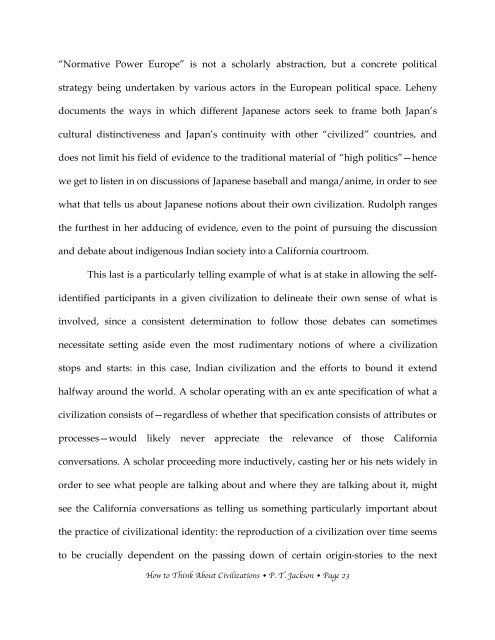How to Think About Civilizations - The Watson Institute for ...
How to Think About Civilizations - The Watson Institute for ...
How to Think About Civilizations - The Watson Institute for ...
You also want an ePaper? Increase the reach of your titles
YUMPU automatically turns print PDFs into web optimized ePapers that Google loves.
“Normative Power Europe” is not a scholarly abstraction, but a concrete political<br />
strategy being undertaken by various ac<strong>to</strong>rs in the European political space. Leheny<br />
documents the ways in which different Japanese ac<strong>to</strong>rs seek <strong>to</strong> frame both Japan’s<br />
cultural distinctiveness and Japan’s continuity with other “civilized” countries, and<br />
does not limit his field of evidence <strong>to</strong> the traditional material of “high politics”—hence<br />
we get <strong>to</strong> listen in on discussions of Japanese baseball and manga/anime, in order <strong>to</strong> see<br />
what that tells us about Japanese notions about their own civilization. Rudolph ranges<br />
the furthest in her adducing of evidence, even <strong>to</strong> the point of pursuing the discussion<br />
and debate about indigenous Indian society in<strong>to</strong> a Cali<strong>for</strong>nia courtroom.<br />
This last is a particularly telling example of what is at stake in allowing the selfidentified<br />
participants in a given civilization <strong>to</strong> delineate their own sense of what is<br />
involved, since a consistent determination <strong>to</strong> follow those debates can sometimes<br />
necessitate setting aside even the most rudimentary notions of where a civilization<br />
s<strong>to</strong>ps and starts: in this case, Indian civilization and the ef<strong>for</strong>ts <strong>to</strong> bound it extend<br />
halfway around the world. A scholar operating with an ex ante specification of what a<br />
civilization consists of—regardless of whether that specification consists of attributes or<br />
processes—would likely never appreciate the relevance of those<br />
Cali<strong>for</strong>nia<br />
conversations. A scholar proceeding more inductively, casting her or his nets widely in<br />
order <strong>to</strong> see what people are talking about and where they are talking about it, might<br />
see the Cali<strong>for</strong>nia conversations as telling us something particularly important about<br />
the practice of civilizational identity: the reproduction of a civilization over time seems<br />
<strong>to</strong> be crucially dependent on the passing down of certain origin-s<strong>to</strong>ries <strong>to</strong> the next<br />
<strong>How</strong> <strong>to</strong> <strong>Think</strong> <strong>About</strong> <strong>Civilizations</strong> • P. T. Jackson • Page 23
















